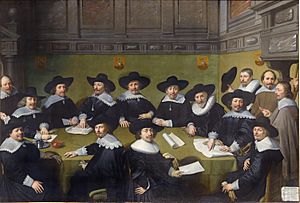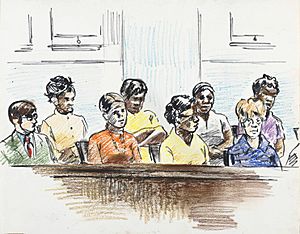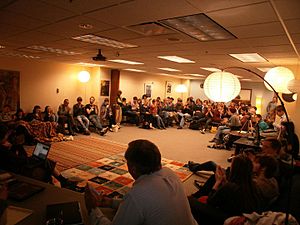Deliberation facts for kids
Deliberation means thinking carefully about different choices. It's like weighing your options before you make a big decision, especially before you vote. It's all about using logic and good reasons, not just arguing or trying to win. When groups make decisions, they often talk things through first. Then they might vote or agree together (consensus).
A good example is a jury in a court. They discuss all the facts and arguments before deciding if someone is guilty or not. In a "deliberative democracy", people like elected leaders and citizens try to use careful thinking. This helps them make fair decisions instead of just fighting for power.

Contents
How Juries Use Deliberation
In countries that use a jury system, the jury's job is to talk about the case. In serious cases, they decide if someone is guilty or innocent. In other cases, they might decide if one side in a disagreement is right or wrong. Their decision can lead to actions that both sides must follow.
Usually, all members of a jury must agree on a decision. If they can't all agree, and they feel they never will, they are called a 'hung jury'. This means the trial might have to happen again.
A famous movie that shows how a jury deliberates is 12 Angry Men. It shows how people can change their minds through discussion.
Deliberation in Politics
In political philosophy, thinkers have many ideas about how deliberation works in different governments. Some believe it's a very important part of a democracy. Others worry it might not always work well.
Many modern ideas about democracy see deliberation as a way to make good decisions. This is often compared to governments that are too controlling or unfair. So, how deliberation works is a big topic in political discussions.
In general, deliberation describes a way that different people interact. They follow certain rules or boundaries when they discuss things. Good deliberation often includes talking face-to-face, making good public rules, and making smart decisions together.
The idea of careful thinking goes back to ancient thinkers like Aristotle. He talked about phronesis, which means "practical wisdom." This is when people think deeply to understand the good or bad results of their actions.
Some thinkers believe that if the rules for discussion are too strict, it can stop real deliberation from happening. For example, John Rawls and Jürgen Habermas had different ideas about this.
"Public deliberation" is about making political decisions by including everyone and encouraging interaction. When citizens discuss different ideas, weigh options, and accept shared decisions, public opinion becomes stronger and more reliable.
Radical Deliberation
Radical deliberation is a way of thinking about discussion that came from the student protests in May 1968. Thinkers like Michel Foucault, Ernesto Laclau, Chantal Mouffe, Jacques Rancière, and Alain Badiou also focus on deliberation. They believe that when different ideas come together, it creates the chance for new politics to happen.
These thinkers often say that a true democracy is always changing. It's not a finished thing. Changes happen outside of what any one person plans. Instead, they come from how larger groups of people talk and act together.
For example, Chantal Mouffe talks about 'the democratic paradox'. This means that democracy works well because it has basic contradictions. These contradictions create a helpful tension between people who respect each other's right to speak. She believes that society will always be re-arranged and re-discussed.
See also
- Online deliberation
- Blank pad rule
- Argument map
- Dialogue mapping
- Low-information rationality
 In Spanish: Deliberación para niños
In Spanish: Deliberación para niños
Other thinkers
- Hannah Arendt
- Giorgio Agamben
- Bruno Latour
- Bonnie Honig
- Lauren Berlant
 | James B. Knighten |
 | Azellia White |
 | Willa Brown |



